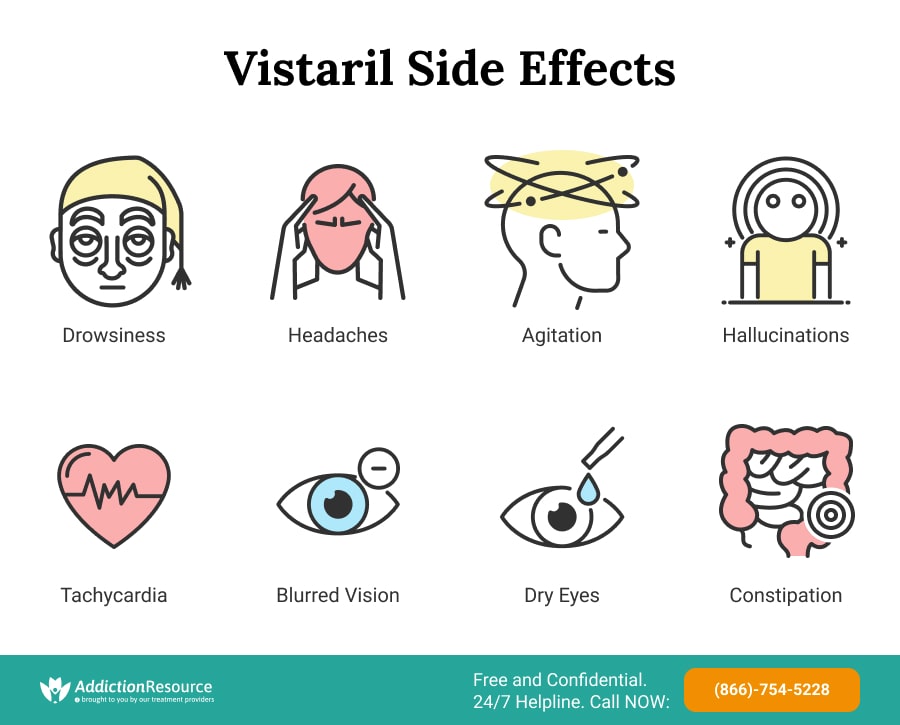Vistaril is the brand name of a piperazine derivative, first-generation H1-antihistamine medication Hydroxyzine pamoate. It can be used to relieve symptoms of anxiety and tension associated with psychoneurosis and other medical conditions which manifest with anxiety; to relieve symptoms associated with allergic conditions; and as a sedative when used pre- and post-anesthetic drugs.
Table Of Contents:
Although antihistamine medications, particularly Vistaril, have a broad spectrum of medical use both in allergic and non-allergic health conditions, they are also associated with a large number of adverse reactions due to their pharmacological mechanism of action. The extent of Vistaril side effects is dose-dependent and ranges from mild symptoms such as slight dizziness to significant blood pressure fluctuations. Additionally, these effects can be particularly undesirable for specific subsets of patients, such as those women who are pregnant or those patients who take other medications that may come into interaction with Vistaril. Therefore, it is essential for patients to receive information about the side effects of Hydroxyzine from their doctor before they begin taking this medication to avoid excessive adverse health reactions and toxicity due to overdose.
Vistaril Side Effects
As Vistaril (Hydroxyzine pamoate) is a first-generation H1-antihistamine medication, it is associated with a broad array of medical adverse reactions that may negatively affect the patient’s health. The most concerning Hydroxyzine pamoate side effects are those that affect the Central nervous system (CNS) such as impairment of cognitive function, memory, and psychomotor performance which may have serious consequences on the patient’s health and may prove to be life-threatening if taking Hydroxyzine is combined with operating machinery or driving.
Common Side Effects of Hydroxyzine
Accurate Information about the frequency with which side effects of Hydroxyzine occur is difficult to ascertain as antihistamine medications are over-the-counter (OTC) and are not specifically regulated by the U.S Food and Drug Administration (FDA). Regardless, information from non-FDA sources is still available regarding the adverse reaction associated with antihistamine drugs as a whole as well as specifically Vistaril side effects from its manufacturer, the medical company Pfizer.
The Central Nervous System Side Effects of Hydroxyzine Are Mediated Through Interference With Neurotransmitter Effect of Histamine Through h1 Receptor and Include:
- Drowsiness
- Fatigue
- Somnolence
- Dizziness
- Impairment of Cognitive Function, Memory, and Psychomotor performance
- Headache
- Dystonia involuntary muscle contractions causing slow repetitive movements or abnormal postures
- Dyskinesia involuntary, erratic, writhing movements of the face, arms, legs, or trunk
- Agitation
- Confusion
- Hallucinations

Cardiac adverse effects from taking Vistaril are mediated through the antimuscarinic and antiadrenergic effects of Vistaril as well as through blockade of various ion currents which are essential for normal heart muscle contraction.
These Adverse Symptoms Can Include:
- Tachycardia
- Prolonged atrial refractory period
- Supraventricular arrhythmias
- Dose-related prolongation of the QTc interval
- Ventricular arrhythmia
Autonomic nervous system adverse reactions related to taking Vistaril manifest as ocular, gastrointestinal and genitourinary symptoms. These Can Include:
- Mydriasis (pupillary dilation)
- Blurred vision
- Xerophthalmia (dry eyes)
- Xerostomia (dry mouth)
- Decreased gastrointestinal motility
- Constipation
- Urinary retention and hesitancy
In addition to the adverse effects mentioned above, there can be a vast array of other rare adverse reactions based on information from patients in various post-marketing studies. However, it is important to remember that these can be brought on by numerous other factors and a causal relationship is not necessarily established between their emergence and Vistaril use.
What Causes Side Effects of Hydroxyzine?
Vistaril side effects involve the Central nervous system, Cardiac, Ocular, Gastrointestinal, and Urinary systems which can impact the patient’s health adversely. The mechanisms through which Hydroxyzine pamoate side effects can occur include interference of the neurotransmitter effect of histamine through the H1-receptors within the brain; Antimuscarinic effects; Blockade of Alpha-adrenergic sympathetic transmission, Blockade of various cardiac currents; Blockade of Serotonergic transmission to name a few.
Another important aspect regarding Hydroxyzine pamoate side effects is the fact that they are dose-dependent, meaning that their severity is directly correlated with the dose of the drug taken. Additionally, side effects of Hydroxyzine can occur even while taking a usual, prescribed dose.
Dangers Of Long-Term Use
The information about the consequences of long-term use of Hydroxyzine is lacking, as prospective studies analyzing its prolonged use are still undertaken. However, some information does exist regarding the consequences of long-term use of antihistamine drugs as a whole.
- The prolonged use of some antihistamine drugs has rarely been linked with mild and self-limiting clinically apparent liver injury.
- There is also a risk of developing Tardive Dyskinesia(TD) after years of regular use of antihistamine drugs. Elderly patients may develop athetoid movements like involuntary movements of limbs and the head as well.
- All anticholinergic drugs have been linked with the risk of developing dementia. Therefore anticholinergic properties of Hydroxyzine, especially with chronic use, could predispose individuals to problems with permanently impaired memory and cognition.
- One study in Texas reported a positive association between chronic use of antihistamine drugs and the risk of developing malignant gliomas, which are the most common primary brain tumors in adults.
If patients wish to get more specific information regarding the long-term dangers of the use of this drug, they should consult their doctor.

Safety of Hydroxyzine During Pregnancy
Currently, there are no first-generation H1 antihistamines that are deemed Category A by the US FDA, meaning that adequate and well-controlled medical studies have failed to demonstrate a risk to the fetus in the first or any other trimester of pregnancy. Concerning Hydroxyzine and pregnancy, it is designated as a category C. Pregnancy category C means that animal reproduction studies have shown an adverse effect on the fetus, but there are no adequate and well-controlled studies in humans, but potential benefits may warrant the use of the drug in pregnant women despite potential risks.
On the other hand, the Michigan Medicaid Birth Defects study has linked hydroxyzine to cleft palate development in newborns. Regardless, the topic of Hydroxyzine and pregnancy requires more research to obtain more definitive information. However, if there is an absolute need for use of an oral antihistamine during pregnancy for an allergic condition it is important that the doctor and patient have a risk/benefit discussion and if possible delay the use of these medications until the second or third trimesters to minimize the health risk to the fetus. In addition, pregnant women should be advised to drink plenty of water when taking antihistamine drugs and to seek immediate consultation with their doctor if they notice any changes in the movement of the fetus or the development of increased contractions.
Lastly, with regard to the topic of Hydroxyzine and pregnancy, breastfeeding warrants a mention. H1 antihistamines are secreted into breast milk and nursing infants receive approximately 0.1% of an orally administered maternal dose. As a result irritability, drowsiness, and/or respiratory depression have been reported in nursing infants whose mothers were taking Hydroxyzine.
Hydroxyzine Warnings And Precautions
There are certain conditions and special populations in whom the use of Vistaril should be cautioned. These include:
- Patients should not operate machinery or drive after taking Vistaril
- The use of hydroxyzine should be avoided with other central nervous system depressants such as narcotics, benzodiazepines, alcohol, and barbiturates.
- This medication should be used very cautiously, due to Hydroxyzine mechanism of action, in the elderly as they are particularly susceptible to its anticholinergic properties and the associated adverse health effects such as falls, cognitive dysfunction, delirium.
- In patients with conditions such as close-angle glaucoma, bladder obstruction, urinary retention, gastrointestinal obstruction, or benign prostatic hypertrophy, the use of Hydroxyzine should be done with caution.
These are just some of the warnings and precautions that patients should be aware of.
For those warnings and precautions that may pertain specifically to a given patient, it is advised to consult the prescribing doctor.
Minimizing Adverse Reactions of Hydroxyzine
In general, there is not much that can be done to “prevent” the development of adverse drug reactions, as they are an unfortunate consequence of treatment. This is particularly concerning as certain adverse reactions of Vistaril may affect the normal daily routines of patients and cause significant distress to them. Hence, it is also an option to consult with a doctor regarding Vistaril alternatives. However, there are still a few ways that these undesirable effects can be minimized and managed so that patients can go on with their day-to-day activities in an efficient manner:
- Taking the medication exactly as directed is very important to minimize adverse reactions, even though Vistaril side effects can even be seen at normal therapeutic doses.
- Not consuming Vistaril with alcohol and certain antidepressants will help prevent the worsening of the adverse reactions of the drug.
- Avoid taking multiple agents that have anticholinergic properties together is also important.
- As most Hydroxyzine pamoate side effects are dose-dependent, reducing its dose may help minimize adverse reactions.
- Stay hydrated can help minimize dry mouth which is one of the most common out of all Vistaril side effects.
Minor adverse reactions of Hydroxyzine may not need any medical management, and many of them can disappear with regular use of the drug as the body gets accustomed to it. Those individuals that experience severe and uncomfortable adverse reactions of Hydroxyzine may consult with their doctor for an alternative antihistamine drug or combination of drugs for the treatment of their particular symptoms.
Besides the presence of common adverse reactions, abuse and addiction are also potential risks for Hydroxyzine users. Anyone, who feels that the use of hydroxyzine or addiction affects one’s life, should seek professional help and treatment. Specialized substance abuse rehabilitation facilities can treat such cases successfully with appropriate treatment and therapies. The patient will be available to choose a suitable substance addiction treatment program that fully fits one’s needs.
Hope Without Commitment
Find the best treatment options. Call our free and confidential helpline
Most private insurances accepted
Page Sources
- Church, M. K., & Church, D. S. (2013). Pharmacology of antihistamines. Indian journal of dermatology, 58(3), 219–224. https://doi.org/10.4103/0019-5154.110832
- Farzam K, Sabir S, O'Rourke MC. Antihistamines. [Updated 2021 Mar 20]. In: StatPearls [Internet]. Treasure Island (FL): StatPearls Publishing; 2021 Jan-. Available from: https://www.ncbi.nlm.nih.gov/books/NBK538188/
- Kar, S., Krishnan, A., Preetha, K., & Mohankar, A. (2012). A review of antihistamines used during pregnancy. Journal of pharmacology & pharmacotherapeutics, 3(2), 105–108. https://doi.org/10.4103/0976-500X.9550
- Simons, F. E., & Simons, K. J. (2008). H1 antihistamines: current status and future directions. The World Allergy Organization journal, 1(9), 145–155. https://doi.org/10.1186/1939-4551-1-9-145
- Tang, Y., Ma, Cx., Cui, W. et al. The Risk of Birth Defects in Multiple Births: A Population-Based Study. Matern Child Health J 10, 75–81 (2006). https://doi.org/10.1007/s10995-005-0031-5




